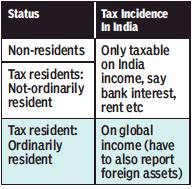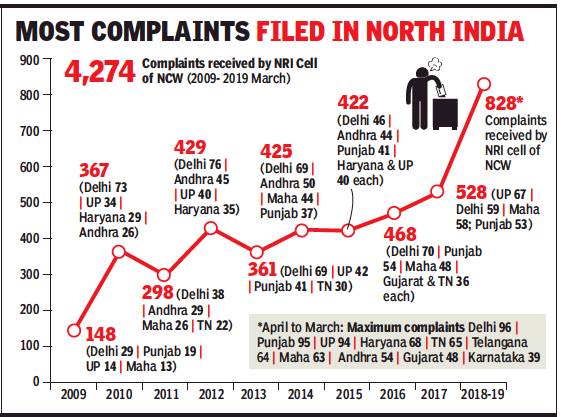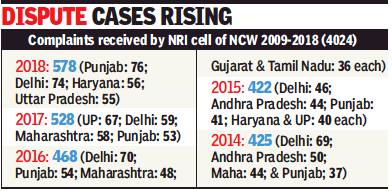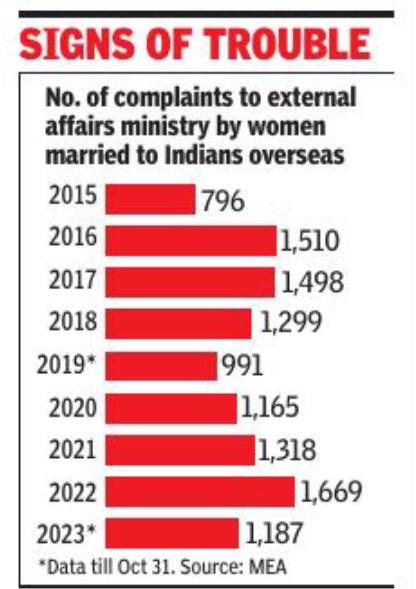Non-resident Indians (NRIs)
This is a collection of articles archived for the excellence of their content. |
Contents |
Definition
2020: definition changed to stop tax avoidance
February 2, 2020: The Times of India

From: February 2, 2020: The Times of India
The Budget has tightened the screws on those seeking to escape tax by exploiting their non-resident status. While earlier it was possible to be classified as non-resident by staying out of the country for 183 days or about six months in a year, this has now been, in effect, enhanced to 245 days.
The change has been made because some taxpayers divided their time between India and overseas to avoid being categorised as tax residents in India. Once a tax resident is further classified as ordinarily resident (OR), he pays tax in India on his global income, which would include say interest income on overseas bank accounts.
As Parizad Sirwalla, partner and head, global mobility services (tax) at KPMG India points out, “Indian citizens and persons of Indian origin who were on visit to India had an extended period of 182 days of stay in India (as opposed to 60 days) before they could be regarded as a resident from an income tax perspective. This period is proposed to be reduced to 120 days now.”
As things stand, an individual is a resident in India for a particular financial year if he has been here for an overall period of 365 days or more within the four years preceding and an overall period of 60 days in that particular year. The 182-day relaxation was made available to Indian citizens and persons of Indian origin.
‘Only The Stateless Will Be Deemed Indian And Taxed’
The Budget memorandum pointed out that this relaxed duration of 182 days was misused by individuals who had significant economic activity in India (say a business), managed their period of stay, so as to remain a non-resident in perpetuity. With such individuals now being required to stay out of the country for 245 days in a year, the misuse becomes more difficult for those having business interests in India.
Gautam Nayak, tax partner at CNK & Associates cautions, “NRIs or Overseas Citizens of India, visiting relatives in India need to now be more careful and limit their stays to less than 120 days in a year, or else they may face tax on their worldwide income.”
After having determined an individual as a tax resident, there is a secondary test to determine whether the individual qualifies as a not ordinarily resident (NOR) or ordinarily resident (OR). Currently there are complex rules to determine when a person is NOR. This has been simplified to say that a person is NOR for a particular financial year if he has been a non-resident in seven out of the ten preceding years. This determination is critical as while an ‘NOR’ is only taxed on India income, an individual who is an ‘OR’ is taxable on his worldwide income.
Another change made is that an Indian citizen not ‘liable to tax’ in any other country or territory shall be deemed to be resident in India. At first glance, it appeared that India’s diaspora which works in Gulf countries (where there is no tax on individual income) would be badly hit.
However, the Finance Bill added that this would be the case if the individual is not liable to tax in any other country by reason of his domicile, or residence or any other criteria of similar nature. Nayak adds, “The SC in the case of Azadi Bachao Andolan has held that the term ‘liable to tax’ is not the same as ‘is actually taxed’. The OECD Model Tax Convention also provides that a person does not have to be actually paying tax to be “liable to tax”. If the host country chooses not to tax such income, it does not mean that they are not “liable to tax” in that country. They may still not be regarded as residents of India. However, the issue needs to be clarified to avoid litigation. This provision would therefore perhaps only impact those Indian citizens who are not residents of any country at all.”
ANI quoted the revenue secretary, Ajay Bhusan Pandey, as saying that only if an Indian citizen is not a resident of any country in the world, he will be deemed to be a resident of India and his worldwide income will be taxed.
Amarpal S Chadha, partner and India mobility leader at EY-India says, “The intent behind this amendment is to tax the Indian citizens who are stateless and enjoy the privilege of not paying taxes in any country or jurisdiction, based on their tax planning. However, a formal clarification on this will be helpful to avoid litigation.”
Legal status, rules
PPF a|c to be closed, NSCs encashed if holder turns NRI
PPF a|c to be closed, NSCs encashed if holder turns NRI, Oct 30 2017: The Times of India
Amending rules on post office savings schemes like the National Savings Certificates (NSC) and Public Provident Fund (PPF), the government has notified that such accounts would be closed prior to maturity in case of holders changing their personal status to become nonresident Indians (NRIs).
The amended rules were notified in the official gazette in October 2017.
The amendment to the PPF Scheme, 1968, says: “If a resident who opened an account under this scheme, subsequently becomes a non-resident during the currency of the maturity period, the account shall be deemed to be closed with effect from the day he becomes non-resident“.
The interest payable would be up to the date of the account closure, it said.
A separate notification on NSCs said in case of a sim ilar change of status of the certificate holder before the maturity period, “the certificate will be encashed, or deemed to be encashed on the day he becomes non-resident“ and interest will be paid accordingly.
NRIs are not allowed in instruments like the National Savings Certificates, Public Provident Fund, Monthly Income Schemes and other time deposits offered by the post office.
In September 2017, the government had retained the interest rate on Public Provident Fund for October-December unchanged at 7.8%, in line with the rates for small savings schemes.
Social issues
Matrimonial tensions
Chethan Kumar, 1 NRI wife calls home for help every 8 hours, February 5, 2018: The Times of India
Many Indian parents look for a foreign match for their daughters but here’s a reason to be wary. On average, at least one woman married to an NRI calls home every eight hours seeking help to return after being deserted by her husband or because of reasons like ill-treatment and physical torture.
Complaints received by the ministry of external affairs (MEA) show that in the 1,064 days between January 1, 2015 and November 30, 2017, the MEA received 3,328 such complaints — an average of more than three calls a day or one every eight hours.
Most of the women are originally from Punjab and Andhra-Telangana followed by Gujarat, say lawyers, activists and people working in Indian missions abroad. The National Institute of Public Cooperation and Child Development, in its study on deserted women some years ago, also confirms this fact.
‘Most dowry complaints from Andhra, Telangana’
Aarthi Rao worked with the Indian embassy in Washington DC for 16 years, six of which were as a community development officer dealing with such cases. “Most women,” she said “were from Andhra Pradesh (including Telangana), where the dowry system is still strong. The boys went to India to please their parents and married someone, but had no intentions of living withthem once they returned.”
Aarthi, who later served as adviser totheMEA, saidshe received a lot of complaints from West Asian countries during her Delhi stint. In one complaint that the MEA received, Shazia (name changed) said shewas stuck in Bahrain as her husband had destroyed her visa document and was preventing her from making calls.
The erstwhile Overseas Indian Affairs Ministry, now merged with MEA, had introduced a scheme for such women in 2007. The MEA now addresses the issue through its grievance redressal portal, MADAD. Besides, all missions also receive complaints from women and help them both financially and legally.
Not all complaints go to the ministry. Chennai-based lawyer Sudha Ramalingam says the majority are from West Asian countries, the US and Canada. “Just six weeks ago, there was a man working with Qatar Airlines harassing his wife. She reached out to me after great difficulty and we’ve just managed to get her separated from her husband,” she said. While Ramalingam said there was “no one solution” to the problem, sociologist Samata Deshmane attributedittoIndian parents’ “obsession” with acertain status associatedwith NRI grooms.
2009-18: 3,500 plaints of desertion by NRI men
3,500 plaints of desertation by NRI men in last 9 years: NCW, July 31, 2018: The Times of India
The National Commission for Women has received 3,569 complaints since 2009 from women who were deserted by their NRI husbands. A total of 355 complaints were received from Punjab alone during this period.
NCW chief Rekha Sharma said that the commission will push for stringent punitive measures against NRI husbands who desert their Indian wives. “An analysis of data reveals harassment and ill treatment in many ways, including abandonment, loss of communication with spouse upon leaving India, brief holidaymarriages and cheating,” Sharma said at the National Seminar on ‘NRI Marriage Related Issues in Punjab’ held in Jalandhar.
“Matrimonial advertisements by parents often highlight their daughters’ qualifications and background when seeking NRI grooms. They don’t conduct detailed verification or cross-check background for grooms,” she said.
Over 20 women deserted by their NRI husbands participated in the seminarand presented recommendations to stakeholders. Officials from Punjab NRI commission, police, district and state administration, local body representatives and civil society organisations were part of the seminar. Among various measures being planned to crack down on absconding NRI husbands, the government is also working on detterence.
2009-19
Ambika Pandit, April 29, 2019: The Times of India

From: Ambika Pandit, April 29, 2019: The Times of India
Complaints against absconding NRI husbands continue to rise with 2018-19 seeing the highest number of such cases reported since the NRI cell in the National Commission for Women came into existence 10 years back. Information available with the NCW shows that of the ministry of external affairs since last year has initiated action to either suspend or revoke the passports of 61 men. Another 14 cases recommended by the women’s body for action are under scrutiny.
While complaints come from all over India, the 2018-19 tally of 828 complaints show maximum cases have been reported from north Indian states. The highest number of complaints in 2018-19 came from Delhi (96) followed by Punjab (95), Uttar Pradesh (94) and Haryana (68). There are significant number of complaints from south India too with 65 complaints from Tamil Nadu, 64 from Telangana and 54 from Andhra Pradesh. There have also been many complaints from Maharashtra (63) and Gujarat (48) too.
With the complaints rising every year, NCW officials point that more and more women are now coming forward to report the cases.
2014-18: complaints received by NCW
To hasten process, Maneka moves Rajnath, November 14, 2018: The Times of India

From: To hasten process, Maneka moves Rajnath, November 14, 2018: The Times of India
The home minister has agreed to call the meeting of the informal group of ministers. This informal group of four ministers led by Singh was set up in June to discuss concerns and look for solutions to concerns arising out of recommendations made by the inter-ministerial panel on the matter and agreed upon in principle in June. Led by Sushma Swaraj the inter-ministerial panel was set up in 2017.
When this group of ministers met in June this year, Singh chaired the deliberations where it was felt that there is a strong need to find solutions, even innovative ones, to tighten the law and and bring non-resident Indian offenders to book. The meeting was to be followed by preparation of a Cabinet proposal after legal scrutiny. The meeting which had considered the legal tenability of measures is understood to be in agreement of the changes in the law that will be required. However, the finalisation of the proposal is still under process as fresh concerns have been cited.
To build pressure on absconding NRI husbands who have failed to respond to court summons, the Centre has been exploring changes in law to enable confiscation of joint family property and alienation of land to stop any sale of commonly owned property. It was also proposed to bring changes in laws for putting up unanswered summons on the website of the ministry of external affairs and these will be considered served.
2015-23
Kenneth Mohanty, March 6, 2024: The Times of India

From: Kenneth Mohanty, March 6, 2024: The Times of India
Since 2015, more than 11,000 women married to Indians abroad have approached India’s foreign missions with complaints of domestic crises. Many cases involve allegations of fraud and abuse. But in most instances, overseas officials are able to do only so much to help. That’s because there is little in Indian law that supports an intervention. However, that might change as the Law Commission has thrown its weight behind a proposal to offer legal recourse in such cases. In its report on ‘Law on Matrimonial Issues Relating to NRIs and OCIs’ submitted last month, the Commission flags the lack of a central law to deal with NRIs. Sec.498A of IPC (cruelty by husband, in-laws) remains the only means NRI wives have of seeking action against their husbands and in-laws over domestic abuse. But the writ of Indian statutes doesn’t run in foreign jurisdictions, which are under no compulsion to deport an accused back home to face charges, the Commission says.
“Problems faced by Indian wives deserted by their NRI husbands”, therefore, need a tailor-made fix, it concludes after its analysis of the Registration of Marriage of Non-Resident Indians Bill, 2019. Tabled in Rajya Sabha, the proposed legislation was referred to the Commission in April last year.
Harassment, Fraud Big Issues
If an NRI son-in-law is quite the sought-after match for Indian girls, a wife from back home is seen as the ideal companion for a son settled abroad. But “intercountry marriages” between NRIs or OCIs and Indian citizens have fuelled a “rapid rise in legal issues”, the Commission says.
Harassment and abuse by the husband and his family, husband going incommunicado after moving overseas, failure to obtain maintenance and child support from the spouse, child custody, and request for extradition or deportation of spouse to India constitute the bulk of complaints filed by NRI wives, the govt had told Parliament in 2019. The Commission found that “deceptive practices like false assurances, misrepresentation, and abandonment are commonly associated with these fraudulent unions”.
Given the stakes involved in a shift abroad, there is an element of convenience that can sometimes drive such marriages. In Punjab, for instance, it’s not uncommon to come across matrimonial ads seeking IELTS-qualified brides with the prospective groom’s family promising to foot the bill for her studies abroad; a win-win since the bride gets to earn a foreign degree and her husband hitches a ride on a dependent visa to work abroad. Pragmatic as they are, such arrangements can end in desertion and allegations of fraud. In fact, Canada recently removed dependent visas for spouses of students in undergraduate courses to check the rampant use of this route to landing abroad.
What Law Commission Said
The 2019 Bill deals with the registration of marriages between NRIs and Indian citizens. And while instances of aggrieved husbands knocking on court’s doors for remedy are not unknown, the proposed law and the Commission’s suggestions are geared towards addressing the issues faced by Indian wives abroad. Among the provisions discussed are the impounding of passports and the serving of e-summonses and attachment of property of “delinquent husbands”.
But it begins with the need for a clear definition. To cast the net as wide as possible, the Commission says that an NRI should be defined as “a citizen of India, who resides outside lndia for any purpose whatsoever, save tourism”.
Such unions should be registered within 30 days of solemnisation, in India or abroad, with travel details and overseas residential address included in the paperwork. But since storing or updating of such information is not mandated by existing Indian marriage registration laws, the Commission says a separate central NRI marriage registry be created for the purpose. It adds that a photocopy of the passport of the NRI husband “may be pasted in the marriage register... before the marriage certificate is actually issued to the parties”.
It also suggests that the Passports Act, 1967, be amended to make it mandatory for holders to declare their marital status and link their passport with that of the spouse. But what about someone who is an Indian citizen at the time of marriage and then moves abroad? For that, it circles back to the need to ensure the compulsory registration of all marriages in India, whether they are performed under statutory or personal laws.
As for divorce proceedings involving Indian wives abroad, it notes that if an Indian settled abroad marries in India, the marriage is to be governed by the Indian law under which they have married. If the parties have become foreign citizens and obtained a decree from a foreign court then the Indian court would apply rules of international law to decide the matter. The Commission says that the NRI marriage law should also cover aspects like child custody, rehabilitation, etc.
To ensure the appearance of spouses settled abroad during court hearings, the Commission says that the provision for serving of e-summons included in the yet-to-be-notified Bharatiya Nagarik Suraksha Sanhita, 2023 (BNSS), or the new CrPC, be extended to NRIs. It also wants the provision for attachment of the property of a proclaimed offender laid down in BNSS to cover NRIs.